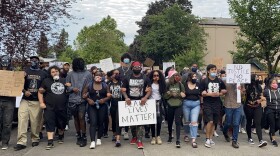Defunding Eugene’s police force is not an option for advancing law enforcement, says its chief. As KLCC’s Brian Bull reports, Chris Skinner shared those remarks today, one week following a major downtown riot.
Across the country, many activists have called on cities to defund their police departments, following fatal incidents of police brutality, including that of George Floyd. This week, Los Angeles announced it’s diverting $150 million from its budget to instead invest in minority communities.
EPD Chief Chris Skinner says his force needs to keep improving on response times and community relations.
“Divesting in police and defunding police means we take a huge step backwards, and fall back to our roots and the core of our mission, which is just simply answering calls for service," he said.
"When what a 21st Century police department does, is build trust and legitimacy by investing in programs and community and opportunities to connect with those people that we serve.”
In a separate press conference later the same day, Eugene Mayor Lucy Vinis also shared her support for keeping the funding for city police. She acknowledged receiving more than 300 emails requesting law enforcement reforms, including the 8 Can't Wait proposals.

The EPD has been criticized for a delayed response to rioting May 29th, which saw four Eugene businesses destroyed. And for the curfews set over the weekend. Others have thanked police for allowing activists to continue protests, even when disrupting traffic.
Friday Night Riots Atypical For Eugene
The level of violence and destruction seen in the May 29th riots that trashed four Eugene businesses is "unprecedented", says a police officer.
EPD Captain Eric Klinko has served for 25 years. He says while the city has certainly seen unrest – including during the Vietnam War and the anarchist movement of the early 2000s – the fiery hatred seen last week isn’t something he’s experienced before.

“The vast majority of protests that we have here in Eugene are incredibly peaceful," says Klinko. "We learned almost 20 years ago, that we are better served by reaching out to organizers when and if at all possible, and try to make the event safe.”
The EPD says the majority of rioters were young white people, and there’s evidence some came in from Portland and Roseburg just to cause destruction.
The week’s worth of protests that have followed since have been peaceful.
Checks And Balances For City Police Exist, But Not Completely Transparent
The accountability of Eugene’s Police Force was also discussed at today's press conference, which included its independent auditor.
Mark Gissiner says he reports directly to the Mayor and City Council on matters of alleged wrongdoing within the EPD. He adds the toughest part of his job are the 458 exemptions in Oregon’s public records law that can be an “Achilles heel” at times.

Referring to the Eight Can’t Wait reforms proposed by activists for law enforcement, Gissiner says there is reporting by police against fellow officers already taking place within the EPD.
"Again, we can’t publicize it and we can’t identify people because of two of the exemptions in the public records law, but that occurs in this organization with members of the community," Gissiner told the press.
"And I know that it takes courage to do that when you’re in this type of organization.”
Questions about police actions have involved curfew notices, and the use of crowd control devices including tear gas in the past week.
WEB EXTRA: EPD officers explain some of their munitions used in the past week:
Copyright 2020, KLCC.










